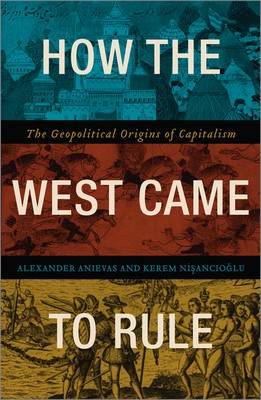
- We will send in 10–14 business days.
- Author: Alex Anievas
- Publisher: Pluto Press (UK)
- Pages: 406
- ISBN-10: 0745336159
- ISBN-13: 9780745336152
- Format: 15.2 x 22.6 x 2.5 cm, softcover
- Language: English
- SAVE -10% with code: EXTRA
Reviews
Description
***Winner, International Studies Association International Political Sociology Best Book Prize 2017******Winner, British International Studies Association International Political Economy Working Group Book Prize 2016*** Mainstream historical accounts of the development of capitalism describe a profess which is fundamentally European--a system that was born in the mills and factories of English and under the guillotines of the French Revolution. This groundbreaking book tells a very difference story. How the West Came to Rule offers a unique interdisciplinary and international historical account of the origins of capitalism. It argues that, contrary to dominant wisdom, capitalism's origins should not be understood as a development confined to the geographically and culturally sealed borders of Europe, but the outcome of a wider array of global processes in which non-European societies played a decisive role. Here is a provocative, incisive explanation of how capitalism emerged in England and Europe through a dialectical intersocietal and geopolitical process. The authors' aim to undermine a Eurocentric bias that has been prominent in the debate about capitalisms rise to supremacy, and their case is remarkably convincing. They provide a fundamental rethinking. Anievas and Nisancioglu contend that often cited assumptions are neither theoretically nor empirically tenable and deny the agency of non-Western societies to the emergence of capitalism. Topics covered include: *The Problem of Eurocentrism
*The Problem of Historical Specificity
*The Brenner Thesis: Explanation and Critique
*The Geopolitical in the Making of Capitalism
*The Political Marxist Conception of Capitalism
*Rethinking the Origins of Capitalism
*And much more! Through an outline of the uneven histories of Mongolian expansion, New World discoveries, Ottoman-Habsburg rivalry, the development of the colonies, and bourgeois revolutions, Alex Anievas and Kerem Nisancioglu offer an account of capitalism's origins that convincingly argues against the prevailing Eurocentric narratives. It will change minds and open the eyes of historians, economists, and political thinkers.
EXTRA 10 % discount with code: EXTRA
The promotion ends in 18d.15:35:03
The discount code is valid when purchasing from 10 €. Discounts do not stack.
- Author: Alex Anievas
- Publisher: Pluto Press (UK)
- Pages: 406
- ISBN-10: 0745336159
- ISBN-13: 9780745336152
- Format: 15.2 x 22.6 x 2.5 cm, softcover
- Language: English English
***Winner, British International Studies Association International Political Economy Working Group Book Prize 2016*** Mainstream historical accounts of the development of capitalism describe a profess which is fundamentally European--a system that was born in the mills and factories of English and under the guillotines of the French Revolution. This groundbreaking book tells a very difference story. How the West Came to Rule offers a unique interdisciplinary and international historical account of the origins of capitalism. It argues that, contrary to dominant wisdom, capitalism's origins should not be understood as a development confined to the geographically and culturally sealed borders of Europe, but the outcome of a wider array of global processes in which non-European societies played a decisive role. Here is a provocative, incisive explanation of how capitalism emerged in England and Europe through a dialectical intersocietal and geopolitical process. The authors' aim to undermine a Eurocentric bias that has been prominent in the debate about capitalisms rise to supremacy, and their case is remarkably convincing. They provide a fundamental rethinking. Anievas and Nisancioglu contend that often cited assumptions are neither theoretically nor empirically tenable and deny the agency of non-Western societies to the emergence of capitalism. Topics covered include: *The Problem of Eurocentrism
*The Problem of Historical Specificity
*The Brenner Thesis: Explanation and Critique
*The Geopolitical in the Making of Capitalism
*The Political Marxist Conception of Capitalism
*Rethinking the Origins of Capitalism
*And much more! Through an outline of the uneven histories of Mongolian expansion, New World discoveries, Ottoman-Habsburg rivalry, the development of the colonies, and bourgeois revolutions, Alex Anievas and Kerem Nisancioglu offer an account of capitalism's origins that convincingly argues against the prevailing Eurocentric narratives. It will change minds and open the eyes of historians, economists, and political thinkers.


Reviews